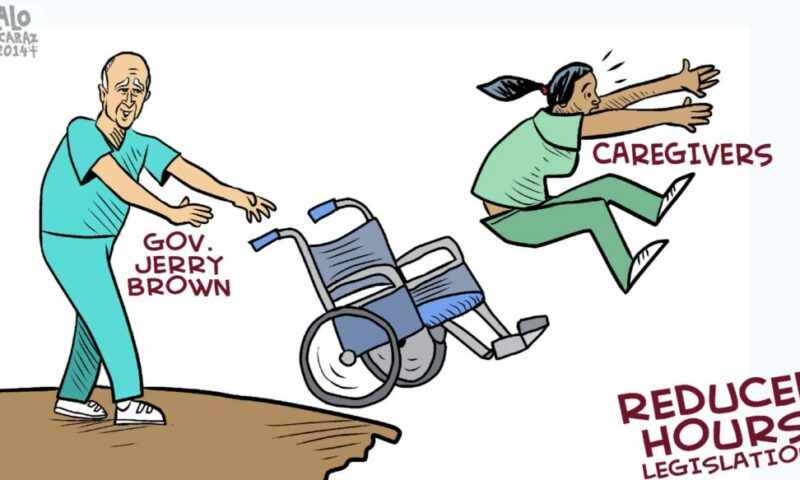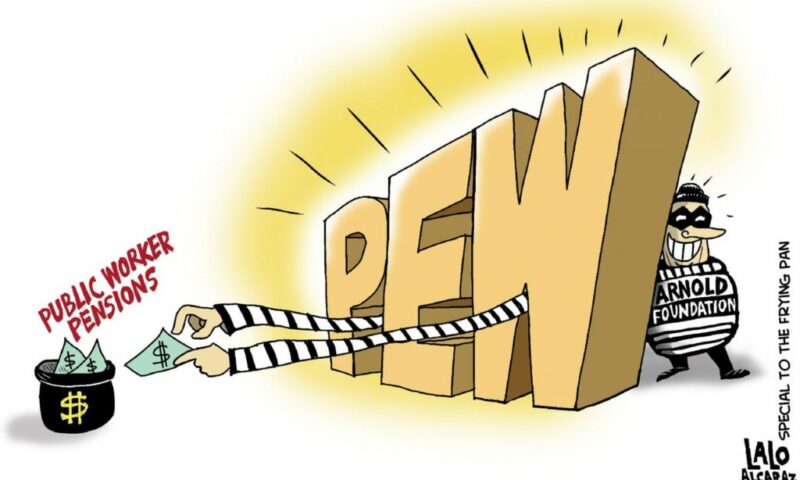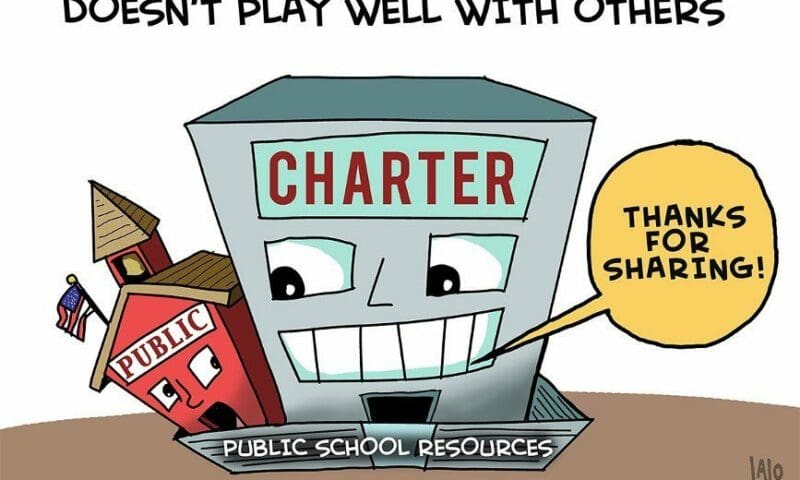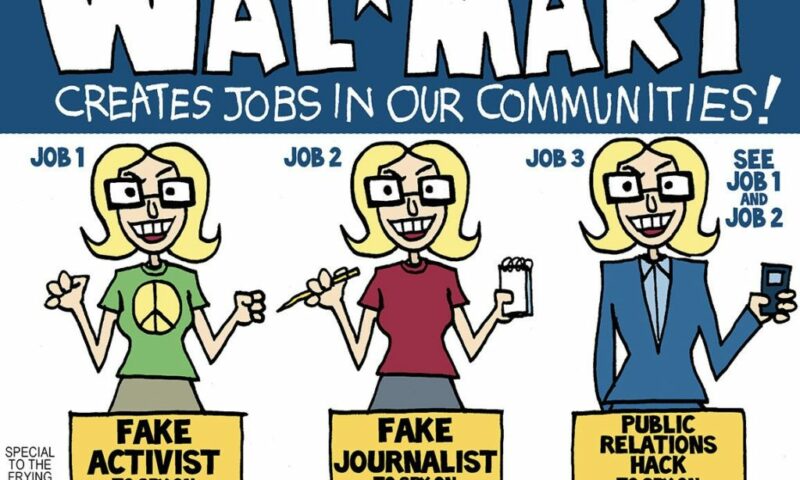

Jon Coupal is nothing if not blunt when he describes one motive behind a Ventura County ballot measure that would replace the “defined benefit” pensions currently enjoyed by county employees and replace them with 401(k)-type plans for all future hires.
“This is meant to be a template for other counties,” Coupal tells Capital & Main. By that, the Howard Jarvis Taxpayers Association’s president means the measure’s conservative and libertarian backers see the “Sustainable Retirement System Initiative” as the newest and most promising weapon in their assault on California’s public employee retirement plans. Having failed to place similar measures on state ballots in 2012 and 2014, a coalition of wealthy individuals, anti-tax activists and government privatizers has seized on an aspect of California law that allows 20 counties to fashion their own public employee retirement policies apart from the CalPERS system that administers such policies for nearly all of the state’s remaining 38 counties.
» Read more about: Domino Effect: Pension Cutters Gamble on a California Ballot Measure »


This week we continue our series about the shaping of California’s laws and policies by Corporate Democrats. In his second article, Pulitzer Prize-winning investigative reporter Gary Cohn examines how a bill does not become a law when powerful business interests lobby against it.
[divider]
Jim Araby was dead asleep when his cell phone rang at 6 a.m. last June. Until then the labor activist had been enjoying an idyllic family vacation in Guerneville, on Sonoma County’s Russian River. But the number appearing on his phone told him the call was from Sacramento, suggesting bad news. The voice he now heard confirmed it.
“Can you get here?” a union colleague asked. “We need you.”
Araby, a regional director of the United Food and Commercial Workers, listened in dismay as he learned that Assembly Bill 880, which more than half a dozen community groups and unions had supported,


When Californians elected Democratic supermajorities in the state Assembly and Senate in 2012, many expected to see a new era marked by progressive policies on everything from the economy to the environment to education. While some change has come, it’s not the kind most voters envisioned when they left the polling booth two years ago.
A central reason, as Pulitzer Prize-winning investigative reporter Gary Cohn reveals in this first article of a new series, is the emergence of the Corporate Democrat, who is not a traditional moderate but an enabler of big developers, gambling concerns, insurance companies and other interests. With the continuing decline of the Republican Party in the nation’s largest state, the Corporate Democrat promises to shape California politics and policies for years to come.[divider]
Marin County is one of California’s most liberal regions and, with its iconic redwoods and stunning coastline, it is also a power center for environmental activism.
» Read more about: In Plain Sight: The Rise of Corporate Democrats in California »


Andrea Vidales makes $9 an hour taking care of a blind Korean War veteran and an elderly couple in their Merced County homes. Under California’s In-Home Supportive Services (IHSS) program, she spends about 60 hours every week bathing her clients, preparing their meals, cleaning house, paying their bills, driving them to doctors and dealing with other aspects of their medical care. She was delighted, then, when the Obama administration, through the U.S. Department of Labor, announced new regulations last September requiring in-home caregivers to be paid overtime for working more than 40 hours a week.
Her good fortune didn’t last long. On January 9, Governor Jerry Brown unveiled his proposed $155-billion budget for 2014-2015 at a press conference in Sacramento. Under the governor’s budget, Vidales and hundreds of thousands of other home health care workers would be prohibited from working more than eight hours a day, or 40 hours a week.


Illustration by Lalo Alcaraz. (Click image twice for full size.)
See Gary Cohn’s reports on California’s enterprise zone program and the tax credits received by two Sacramento strip clubs.
» Read more about: Lalo Alcaraz on State’s Enterprise Zone Program »


To appreciate the value of a community college education, consider the transformation of Shanell Williams.
By the time she was a teenager, Williams was constantly getting into trouble on the streets of San Francisco’s Fillmore District. Her abuse of drugs and alcohol, along with a difficult family life, would lead her into the juvenile justice system, drug treatment centers and foster homes.
“I was a juvenile delinquent,” she admits.
Today Williams, now 29, hardly resembles that troubled youth. She is a hard-working student at City College of San Francisco, taking urban studies courses and hoping to transfer to Stanford University or the University of California at Berkeley. She has served as president of the student council at CCSF’s Ocean campus and was elected to be the student representative on CCSF’s Board of Trustees.
“Community college has helped give me a pathway to higher education,” she says.
That pathway may soon be closing.


The California Chamber of Commerce represents more than 13,000 businesses, from companies such as Microsoft and Walt Disney, to local companies with small numbers of employees. From its K Street headquarters in Sacramento, the “Cal Chamber,” as it’s colloquially known, analyzes some 3,000 pieces of legislation every year. In the past 10 years, 341 of 353 — nearly 97 percent — of the bills opposed by the California Chamber of Commerce failed to become law. The vast majority of these were never passed by the Legislature and sent to the Governor. Instead, they were killed in committee or voted down by the Legislature or amended to take out provisions opposed by the chamber.
The chamber’s weapon of choice is its highly publicized “Job Killers List,” a roll call of bills the chamber claims threaten the interests of business, though its press releases tend to stress the bills’ menace to California’s economy and its workers’ jobs.
» Read more about: DOA: Behind the Chamber of Commerce’s “Job Killers” List »


Last week San Jose Mayor Chuck Reed delivered his usual speech about the benefits of slashing the retirement benefits of his city’s public employees – and why he is now pushing for a statewide ballot measure that could dramatically change the lives of hundreds of thousands of Californians. Reed’s initiative – which he characterizes as a bipartisan effort and which hasn’t yet qualified for the 2014 ballot — would allow the state and local governments to reduce retirement benefits for current employees for the years of work they perform after the measure’s changes go into effect. What was not usual about Reed’s speech was its setting: The Roosevelt Hotel in New York City, 3,000 miles from California.
Reed was a keynote speaker at a “Save Our Cities” conference sponsored by the Manhattan Institute, a conservative think tank co-founded by Ronald Reagan’s CIA director, William Casey.
» Read more about: Pension Cutters: Bipartisan Slogans, Right-Wing Money »


Sandy Hellebrand was concerned. She needed to find a school that could educate her son Gabriel, who has autism and was about to enter high school.
Hellebrand thought she had found the perfect solution: She would enroll Gabriel and her two younger children in Sky Mountain Charter School, one of a rapidly-growing number of virtual schools in California and across the country.
After all, she reasoned, the school would provide excellent online instructional materials and instructors to guide Gabriel’s individual needs. Since Sky Mountain is a publicly funded school – although not a traditional brick-and-mortar one – the state of California would pay for her children’s education. And Hellebrand and her husband Rob, a public high school teacher, would receive about $1,800 a year for each of their children to help defray their costs of educating them at home.
“The idea is fantastic,” she says in an interview with Frying Pan News.




When Kentucky’s legislature adopted a bill intended to transform the Bluegrass State’s troubled pension system last spring, state officials were ecstatic. Signing the bill into law on April 4, Democratic governor Steve Beshear hailed it as groundbreaking legislation that would “solve the most pressing financial problem facing our state – our monstrous unfunded pension liability and the financial instability of our pension fund.”
Not everyone was convinced.
Critics, who include pension-fund experts, lawmakers and AARP Kentucky, claim the new law will hurt workers, taxpayers and retirees. What’s more, they say the law was largely crafted behind the scenes by an unusual alliance between two out-of-state organizations: the Pew Center on the States and the Laura and John Arnold Foundation. Some detractors go further and assert that the Arnold Foundation is using Pew’s sterling reputation for academic integrity as a fig leaf to hide its own free-market agenda.
» Read more about: Promise Breakers: How Pew Trusts Is Helping to Gut Public Employee Pensions »
See original feature by Gary Cohn, “Slash and Burn: The War Against California Pensions.”


See original feature by Gary Cohn, “Interpreter Bill Would Help Save Lives Lost in Translation.”
» Read more about: Lalo Alcaraz on California’s Need for Medical Interpreters »


See Gary Cohn’s article, “Why Charter Schools Are Tearing Public Campuses Apart.”




(Note: This feature first appeared September 21, 2012.)
On September 14 the Web exploded with news that billionaire industrialists Charles and David Koch had donated $4 million in support of Proposition 32. A San Francisco Chronicle editorial noting the donation labeled the brothers “conservative ideologues” – a moniker often applied to the Kochs. This description, however, gives the Kochs far too much credit for their supposed philosophical purity—particularly as it relates to the Prop. 32 battle.
Despite their reputations as libertarian true believers, the Koch brothers are nothing if not practical businessmen, who have no trouble taking advantage of government subsidies when it bolsters their bottom line. (Koch Industries, for instance, was for years heavily invested in the $6 billion, federally subsidized ethanol industry.) That bottom line runs up and down the state of California, where Koch Industries has hundreds of millions of dollars invested through its subsidiary Georgia-Pacific—a gypsum,
» Read more about: Classic Koch: How Prop. 32 Could Enrich Two Billionaires »


» Read more about: Riot Acts: Lalo Alcaraz on LA's "Progress" »


» Read more about: Lalo Alcaraz on Walmart’s Fakes and Hacks »